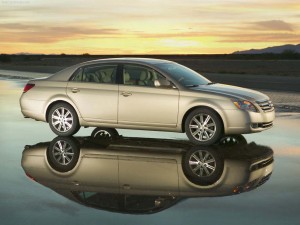
About 740,000 vehicles sold in the U.S., including this 2006 Toyota Avalon, are included in the recall.
Problems with leaky brake lines and faulty fuel pumps have led Toyota Motor Co. to announce the recall of 1.53 million vehicles worldwide.
The latest safety problems come as a severe setback to a company where a senior U.S. official had, only a week before suggested that Toyota had finally put its problems “behind us,” and was working to rebuild its reputation for building high-quality, safe and reliable vehicles.
In all, the maker now has recalled more than 10 million vehicles worldwide, starting with an October 2010 callback – the first of two – to address a so-called “sudden acceleration” problem that could cause the maker’s vehicles to unexpectedly race out of control.
In all, about 740,000 vehicles will be recalled in the U.S., under the latest safety action, due to a leaky master brake cylinder. As fluid slowly leaks out it can cause the brake warning light on the dashboard to illuminate, the company said.
The latest recall involves a variety of models sold in the U.S., including: the 2005 and 2006 Avalon, 2004 through 2006 non-hybrid Highlander and Lexus RX330, and 2006 Lexus GS300, IS250, and IS350.
Customers will be notified in the coming weeks and asked to bring their vehicles back to Toyota or Lexus dealers for no-cost repairs.
Toyota has also announced a recall for a faulty fuel pump problem that can lead vehicles to stall unexpectedly. That problem, the maker says, involves vehicles sold in Japan and Europe, but not the United States.
Toyota claims no accidents have been associated with either defect, but that may almost be irrelevant considering the potential damage having the company name linked in headlines, yet again, to safety problems.
Over the last year, the maker has recalled more than twice as many vehicles as it ever did in a single 12-month period, and significantly more than the nearly 8 million cars, trucks and crossovers it has produced, worldwide, since October 2009.
The maker has been struggling to reverse the damage to its image that occurred not only as a result of the ongoing recalls but under the spotlight of a series of Congressional hearings – and a record $16.4 million fine levied by the National Highway Traffic Safety Administration for failing to properly notify the government of one particular sudden acceleration-related problem.
Following the January 2010 decision to temporarily halt production of eight key products involved in a recall for sticky accelerators, Toyota’s U.S. sales tumbled sharply, forcing the maker to launch the largest incentive campaign in its history.
Sales have begun to regain momentum, noted Don Esmond, the company’s second-highest-ranking American executive, during a visit to Detroit last week. (Click Here for that story.) But Toyota is still lagging the U.S. market overall in terms of 2010 sales gains. Notably, it has slipped to number three in the market, behind General Motors and Ford Motor Co.
During a conversation with reporters, Esmond said Toyota believes the worst of its problems are “behind us,” and outlined a series of steps the company has taken, both in Japan and in the U.S., to better handle quality and safety-related issues.
That includes the appointment of an American-based safety “czar,” and changes in management designed to permit U.S. executives to take action, as needed, without necessarily seeking approval from their Japanese bosses. The NHTSA fine was, in part, the result of a delay caused when Toyota headquarters, in Japan, resisted calls to order repairs on vehicles equipped with accelerators that could occasionally stick open.
The embattled maker has also taken fire — from critics that include safety advocate Ralph Nader — for a new ad campaign in which the maker says it is spending $1 million an hour on R&D. The ad appears to imply that is being invested in safety efforts, in particular, which skeptics have demanded Toyota verify. (Click Here for that story.)
